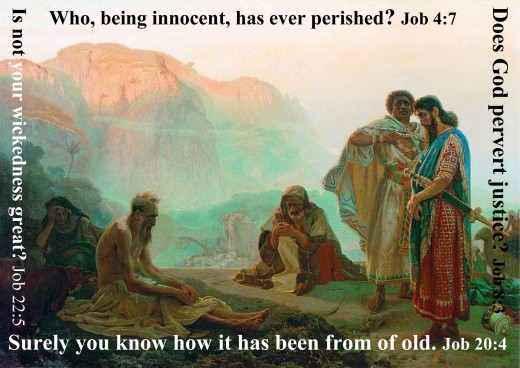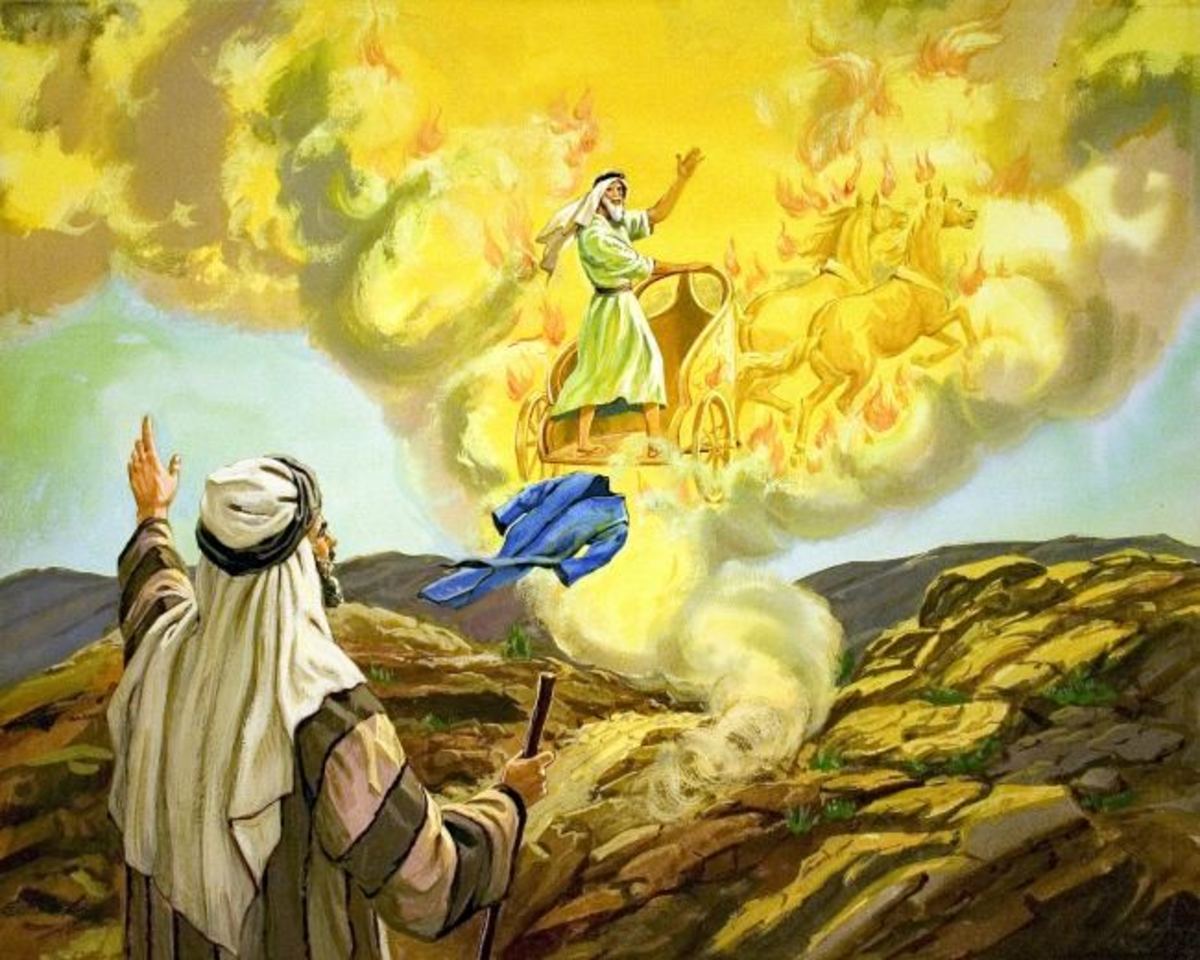Gregor - From The Basic Kafka - As A Modern Job?
Introduction To Gregor As A Modern Job?
Three perspectives are significant as demerits to the claim of Gregor (a central character in 'The Metamorphosis' by Franz Kafka) as a modern Job. The three perspectives are - First, the movement from an anthropocentric to a theocentric perception. Second, the theophany. And, third, the generic cause of suffering - such as transcendental conflict. In contrast to the demerits of this claim, is the merit that both Gregor and Job are of altruistic intent.
The Metamorphosis - Franz Kafka

The Biblical Job

Movement From Anthropocentric To Theocentric Perspective
Job's suffering results in a progressive learning experience. In the beginning Job understands his suffering from an anthropocentric perspective. After learning from his direct life experience, Job becomes theocentric or God-centered. In contrast to Job's theocentricism is Gregor's ever present anthropocentricism. Gregor regards humankind as the central fact of the universe. Gregor remains unconscious of the Divine from the beginning of his suffering and remains so until his death.
"He thought of his family with tenderness and love. The decision that he held to even
more strongly than his sister ... then his head sank to the floor of its own accord and from
his nostrils came the last faint flicker of his breath." (The Basic Kafka, 49-50)
All Gregor's actions during his suffering and all his last thoughts during dying are centered around serving the needs of people in his life (the people at work and the people in his family). The people at work and the people in Gregor's family are the centre of his perception of reality. In contrast to Job, for Gregor there is no movement to a perception of reality where God is at the centre. Gregor never experiences a theocentric perception, where God is at the centre of reality, where God is at the centre of oneself, and where God is central as a motivating force for one's actions. The lack of movement toward theocentriciesm for Gregor demerits the claim that he is a modern Job.
Biblical Jerusalem
Gregor As An Insect

The Theophany
From the perspective of the existence of a theophany, Gregor once again contrasts Job. Job, while he was suffeing an ever deepening state of despair, experiences a theophany. Job's direct discourses with God are a major turning point. Job's profound learning during his theophany restores his trust in the Divine.
In contrast, Gregor remains unconscious of the existence of God. The only metamorphosis or transfomation that Gregor experiences is when he becomes a giant insect. If Gregor wants justice in his situation he must make it for himself. The biblical image for Job is that justice is attained when God makes the whole situation right. However, unlike Job, unto death Gregor remains unconscious of the Divine. In contrast to Job, Gregor lets society dictate who he is. Even though Job suffers, he continues his quest for understanding, until finally he experiences a transformation. Job's transformation enables him to communicate directly with, and work in conjunction with God. The only transformation that Job experiences is his metamorphosis into a large insect. "Am I less sensitive now" (1979, 21), Gregor asks himself. Gregor's question is answered when he watches his sister playing:
"He felt hardly any surprise at his growing lack of consideration for others; there had
been a time when he prided himself on being considerate" (1979, 44).
Not only is Gregor unconscious of the existence of God, but he is also losing his conscientious awareness of the people in his family.
Gregor appears to come to the Kafkaesque conclusion of not knowing what sin is. The biblical image of sin, for Job, is not doing the will of God. In contrast, for Gregor there is no awareness of God, and no awareness of what sin is. Consequently, Gregor is left with only a groundless sense of guilt. Since God does not exist for Gregor, how can he ever be redeemed? Unlike Job, Gregor has no experience of theophany. The fact that Gregor remains unconscious of the Divine is the second demerit to the claim that Gregor is a modern day Job.
The Patience of Job

The Book of Job
Suffering As Transcendental Conflict
Job never does learn about the transcendental conflict that results from the wager between Satan and God. Ultimately, the transcendental conflict is the real purpose behind Job's suffering.
Unlike Job, Gregor has no evidence of transcendental conflict as the origin of his suffering. Gregor's actions are motivated by his desire to re-create a balance where chaos has become prevalent. It is ironic how Gregor's noble actions have such tragic results. Gregor's virtuous intentions have an excess. Gregor is continually giving, sacrificing and working for the benefit of his family. Finally, Gregor loses touch with his individuality and creativity. Gregor becomes only an insect. Instead of experiencing a de-humanizing enslavement to others, Gregor might have aimed at the mean, where virtue creates good instead of tragedy.
Gregor - from Kafka

Altruism
Interestingly, Gregor does portray a merit with respect to the claim that he is a modern day Job. Regardless of the amount of suffering, and regardless of how they perceive reality and the Divine, both characters are altruistic. Whether they succeed in their altruistic quest or not, both Gregor and Job remain true to their highest ideals. Gregor and Job both equally desire to manifest justice in their situations:
"Yet, Gregor had not the slightest intention of frightening anyone." (1979, 48)
"He thought of his family with tenderness and love." (1979, 49)
"He had the firm intention of sending her to the conservatorium, and that but for
his mishap ... he would have announced it to everyone without allowing a single
objection." (1979, 45)
Even unto his death Gregor maintains an altruistic love for his family. Gregor finds comfort in the hope that even if his suffering results in no benefit for himself, perhaps his sister will benefit. Job remains similarly altruistic in intent throughout his suffering. He remains faithful to God and does God's will, even if his suffering results in no benefit for himself.
Job and His Tormentors

Do you think that Gregor can be perceived as a modern day Job?
Final Outcome
The final outcome for Gregor and Job is of paramount imprtance. The end result for Gregor contrasts to that of Job. Whereas Job is finally rewarded materially for enduring his suffering, Gregor's only release from sorrow is death. The futility of Gregor's suffering contrasts with the retribution that Job receives after his suffering. Gregor's suffering remains pointless whereas Job's suffering appears to be a Divine test, that ultimately re-establishes a sense of order. However, even though Job experiences a material retribution after his suffering, he must still experience death after his reward. Death appears as the equalizer, whether or not one receives reward after suffering. Gregor's final outcome demerits the claim that he is a modern Job.
There is a universal application to the existence of death as the great equalizer. The universal application is that whether one experiences reward or suffering in life, everyone will eventually experience the final outcome of death - and everyone will leave this world empty-handed.
Conclusion: Gregor's Demerits As A Modern Job
One can only conclude that Gregor portrays the demerits of the claim that he is a modern Job. There are three significant demerits that Gregor portrays. First, Gregor remains anthropocentric, whereas Job becomes theocentric in perception. Second, Gregor remains unconscious of the Divine, whereas Job experiences a theophany. Third, there is no transcendental conflict as the source of Gregor's suffering. For Gregor, inner conflict and human conflict is the source of his suffering. For Job the transcendental conflict between Satan and God is the only cause of his suffering.
Gregor is just as altruistic in intent as Job. However, the three previously mentioned demerits distinctively portray Gregor in contrast to Job. For the above reasons, from my own personal perspective, conclusively, Gregor is not a modern day Job.
Works Cited
The Basic Kafka 1979, Washington Square Press, New York, N.Y.
© 2014 Deborah Morrison








